
Best alternatives for ChatGPT for Students and Academics
Here’s a quick guide to the best ChatGPT alternatives tailored for students and researchers. These tools help with writing, research, and learning support while ensuring academic integrity.
Top Picks:
- Yomu AI: Focused on academic writing with citation tools, plagiarism checks, and structured feedback.
- Elicit: Ideal for research and literature reviews, offering automated summaries and source validation.
- Learnt.ai: Combines writing assistance with collaborative learning and performance tracking.
- Socratic: Best for homework help and understanding concepts with step-by-step solutions.
- EduWriter.ai: Simplifies essay formatting and citations but has limited free features.
- MyEssayWriter.ai: Great for generating essay drafts, though editing is often needed.
Quick Comparison:
| Tool | Best For | Key Features | Limitations | Pricing |
|---|---|---|---|---|
| Yomu AI | Academic writing | Citation management, plagiarism checks | Limited free credits | Free plan + Paid tiers |
| Elicit | Research and literature reviews | Summarizes papers, validates sources | Limited writing features | Free |
| Learnt.ai | Collaborative learning | Group projects, performance tracking | Learning-focused | Subscription plans |
| Socratic | Homework help | Visual aids, step-by-step solutions | No advanced writing tools | Free |
| EduWriter.ai | Simple essays and citations | APA formatting, reference management | Limited free usage, low output quality | Free + Paid options |
| MyEssayWriter.ai | Essay drafts | Multiple styles, plagiarism detection | Requires heavy editing | Starts at $9.99/month |
Key Takeaway:
Choose the tool that fits your needs:
- For research: Elicit.
- For writing: Yomu AI.
- For learning support: Socratic.
Use these tools to streamline your academic tasks while maintaining originality and integrity.
Jenni AI vs PaperPal: Best AI Tools for Academic Writing in 2024
1. Yomu AI: A Tool for Academic Writing
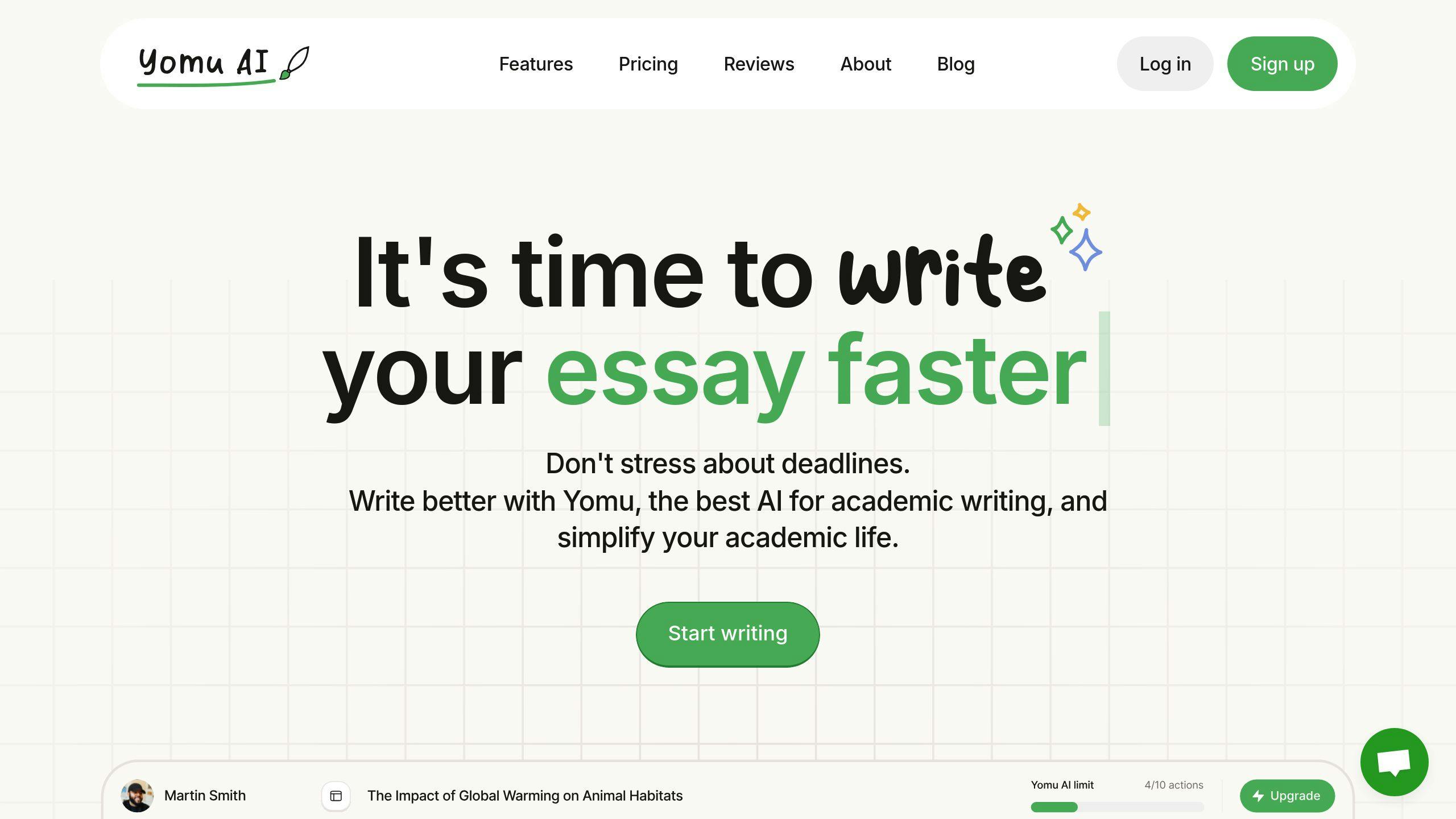
Yomu AI is designed specifically for academic writing, catering to the needs of students and researchers. Its focus on academic content creation makes it stand out from more general AI tools.
Key Features for Academic Writing
Yomu AI blends intelligent assistance with tools tailored for academic needs:
- Context-based suggestions to maintain an academic tone and style
- Advanced paraphrasing and summarization tools
- Citation formatting and bibliography management
- Tools to help prevent plagiarism
- Guidance on structuring documents and providing feedback
| Feature Category | How It Supports Academic Writing |
|---|---|
| Content Generation | Helps create essays and research papers |
| Writing Support | Offers structured feedback and guidance |
| Technical Tools | Manages citations and checks for plagiarism |
| Research Assistance | Provides literature review and summaries |
How to Use Yomu AI Effectively
To get the most out of Yomu AI while ensuring your work stays original:
- Clearly define your thesis and main arguments on your own, then use the AI for additional insights or suggestions.
- Carefully review all AI-generated content to ensure it aligns with your voice and maintains academic standards.
The platform is ideal for a wide range of academic tasks, from essays to research papers, by offering structured support. Its focus on plagiarism prevention and citation management ensures it aligns with academic values of originality and integrity.
"It is recommended to use Yomu AI as a guide, ensuring that the central thesis and arguments are clearly defined by the researcher" [3].
Yomu AI helps streamline academic writing while encouraging critical thinking. However, users should find a balance between leveraging AI tools and honing their independent writing skills [2].
While Yomu AI specializes in writing, other tools like Elicit complement it by focusing on research capabilities, offering a well-rounded solution for academics.
2. Elicit: A Research-Focused AI Tool
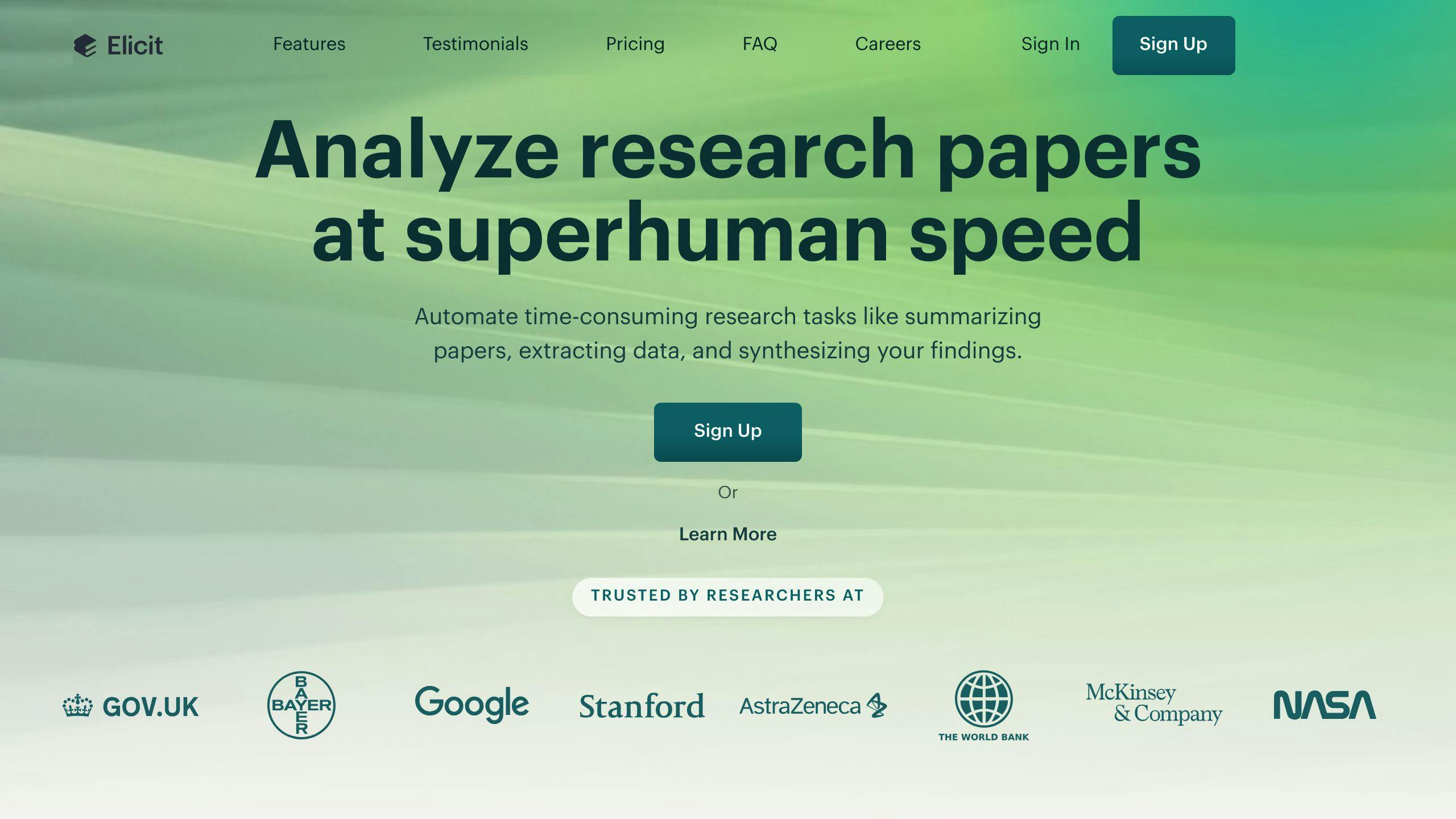
Elicit takes a different approach from Yomu AI by concentrating on academic research and literature analysis. Created by Perplexity AI [1], this platform reshapes how researchers handle literature reviews and study analysis.
Research Capabilities and Applications
Elicit leverages AI to understand academic queries and deliver accurate results, combing through vast academic databases to find relevant studies. Here's what it offers:
| Feature | How It Helps Researchers |
|---|---|
| Literature Review | Automatically scans and summarizes research papers |
| Study Analysis | Highlights key methodologies and findings |
| Source Validation | Assesses credibility and relevance of academic sources |
| Data Synthesis | Combines insights from multiple studies |
Some standout functionalities include:
- Automated processing of academic papers for literature reviews
- Summarizing key findings and methodologies quickly
- Verifying source credibility to maintain high research standards
How to Use Elicit Effectively
To get the most out of Elicit:
- Begin your research by identifying key studies with its tools
- Verify findings with established academic sources
- Combine its insights with your own critical evaluation
"Elicit is designed to support ethical research practices by providing transparent and traceable sources, ensuring that academics can maintain academic integrity while benefiting from AI assistance."
Advancing Academic Research
Elicit is free to use and tailored specifically for research needs. By automating time-consuming tasks, it allows students and academics to dedicate more energy to critical thinking and deeper analysis. The platform continues to grow, with new features like predictive modeling and advanced data analysis on the horizon, making it an invaluable tool for academic work.
3. Learnt.ai: AI for Learning and Writing
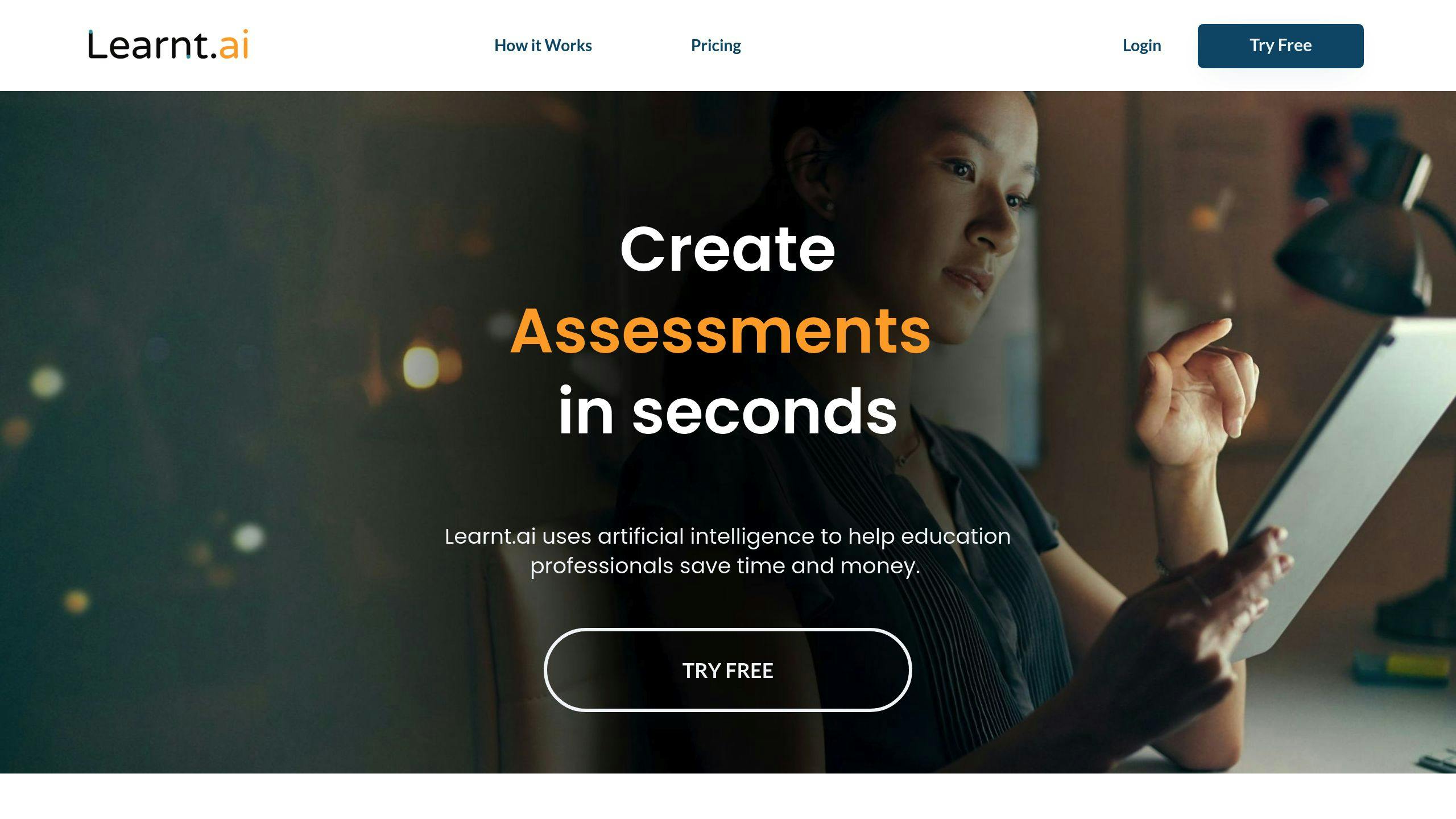
Learnt.ai stands out by combining tools for content creation and educational support, catering to both students and educators. Unlike other platforms, it pairs academic writing assistance with features designed to enhance collaborative learning and track performance.
Key Academic Features
| Feature | Purpose |
|---|---|
| Automated Lesson Planning | Develops structured teaching materials and curricula |
| Content Simplification | Makes complex text more accessible while keeping an academic tone |
| Real-time Collaboration | Supports group projects and peer reviews |
| Performance Tracking | Monitors learning progress and highlights areas needing attention |
Writing and Learning Integration
Learnt.ai helps with academic writing by offering tools for structured outlines, managing citations through its Consensus GPT integration, and analyzing PDFs with AI. These features create a smooth process aimed at building strong, logical arguments rather than just generating surface-level content.
Here’s how its AI-powered tools are used:
- Educational Content Development: Simplifies creating teaching materials while keeping academic integrity intact, supports varied learning needs, and promotes teamwork in teaching and learning.
- Writing Improvement: Enhances clarity in academic writing, makes teaching materials more engaging, and maintains a scholarly tone.
- Learning Analytics: Delivers insights for tailored learning experiences, pinpoints knowledge gaps, and aids in evidence-based teaching methods.
Academic Standards
Learnt.ai aligns with academic principles by promoting originality and providing clear source attribution. Its integration with Consensus GPT ensures reliable citation management, while its PDF analysis tools support modern teaching and learning practices.
4. Socratic: AI for Learning Support
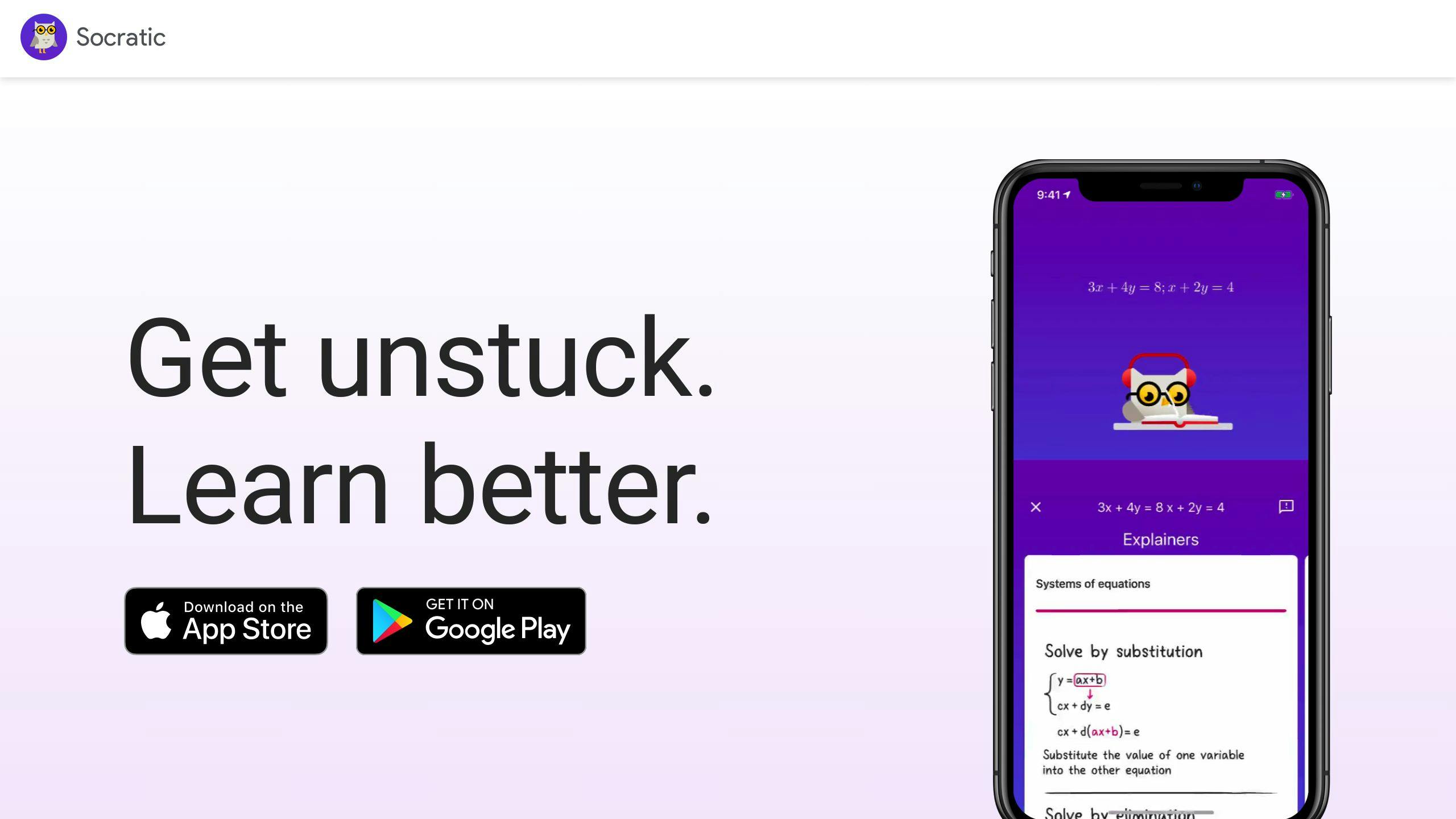
Socratic, acquired by Google in 2018, is designed to assist with education and problem-solving. With millions of users and top ratings on app platforms, it stands out by focusing on helping students understand concepts rather than just generating content.
Subject Coverage and Features
| Feature | Description |
|---|---|
| Worksheet Scanning | Quickly analyzes and solves homework problems |
| Step-by-Step Solutions | Provides detailed explanations for problems across various subjects |
| Visual Learning Support | Includes clear, labeled diagrams for complex topics like calculus or biology |
| Cross-Platform Access | Usable on iOS, Android, and web browsers |
| Subject Areas | Covers Math, Science, Humanities, and more |
A Focus on Learning
Unlike tools like ChatGPT, Socratic is built to deliver accurate, context-rich explanations. Its primary goal is to help students grasp concepts, not just to provide quick answers [4].
Promoting Academic Integrity
Socratic aligns with academic integrity by emphasizing learning processes over simply giving solutions. This approach helps students build critical thinking and problem-solving skills, which is especially helpful when tackling challenging academic topics [4].
Key Benefits for Students
Socratic provides several standout features to enhance learning:
- Step-by-step explanations paired with visual aids
- Access to additional learning materials and resources
- Seamless integration with Google's educational tools for broader learning opportunities
- Free and ad-free access, ensuring no financial barriers
Building Strong Foundations
Socratic's step-by-step problem-solving approach helps students strengthen their understanding and analytical abilities. By focusing on foundational knowledge, the platform supports deeper subject comprehension.
While Socratic excels in interactive learning, other tools like EduWriter.ai specialize in improving academic writing skills, offering a complementary option for students.
sbb-itb-1831901
5. EduWriter.ai: Writing Help for Students
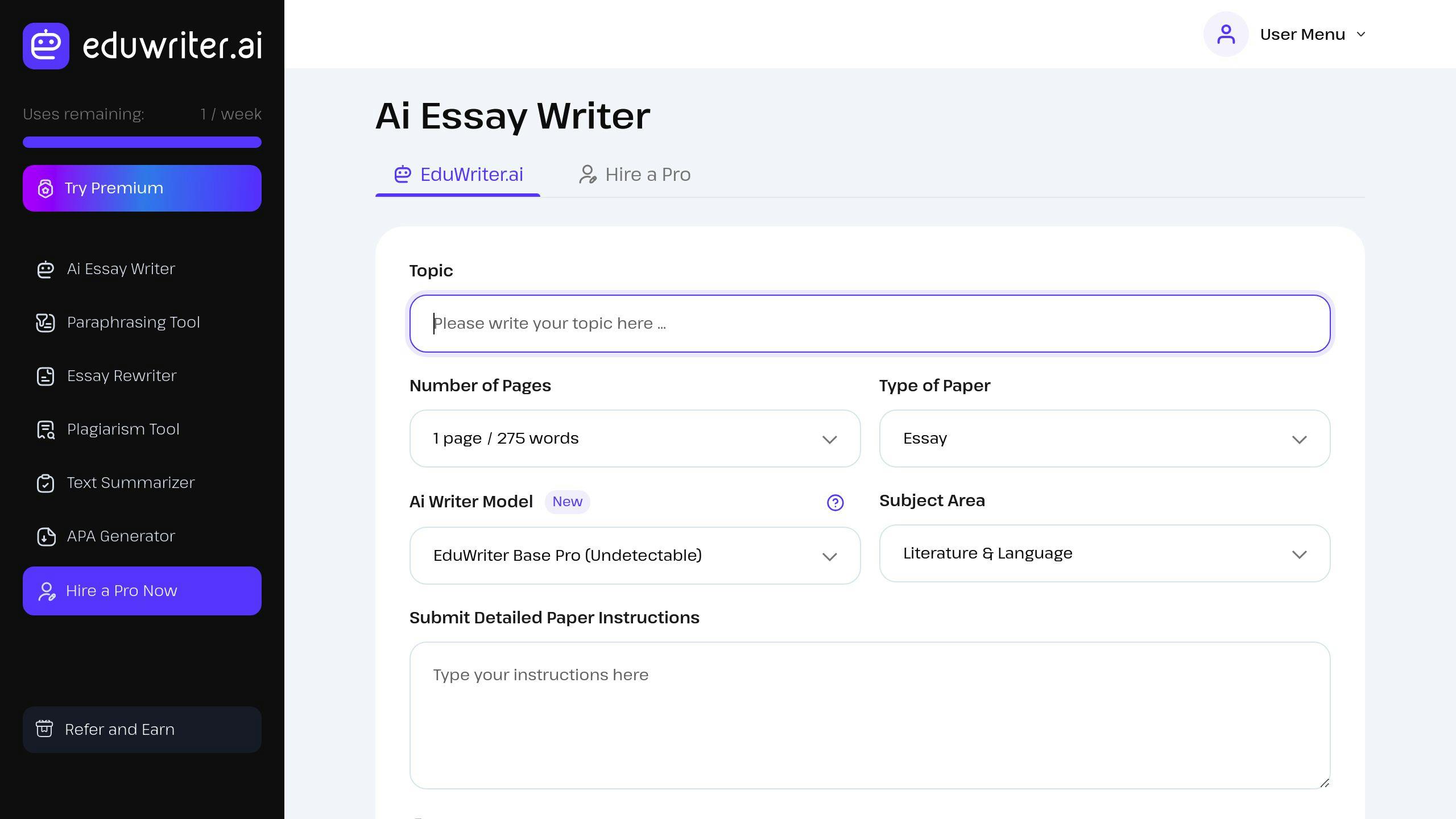
EduWriter.ai provides AI-based writing tools designed for students, but it has notable drawbacks that limit its usefulness for serious academic work.
Features and Tools
- Generates essays with APA formatting
- Handles references, including title pages, citations, and bibliographies
- Offers paraphrasing, summarization, and thesis statement suggestions
- Free version capped at 400 words per day
Performance and Feedback
Reviews consistently highlight problems with output quality and low user satisfaction ratings [5].
Pricing Details
EduWriter.ai includes a free plan with restricted daily usage. Premium options are available, but their value is questionable given the tool's limited capabilities.
Best Uses in Academics
This tool works well for simpler tasks like creating title pages, building bibliographies, or brainstorming thesis ideas. However, it falls short when it comes to crafting complete essays.
Drawbacks
EduWriter.ai has several issues, including:
- A strict daily word limit
- Inconsistent quality in its outputs
- Minimal customization options
These flaws mean users often need to double-check and revise the content extensively.
Expert Opinion
"I could see something like ChatGPT being potentially useful in a composition class or in the writing center as a tool to help students improve their writing skills and to learn proper grammar and style by." - Richard Zdan, Sociology Professor
While EduWriter.ai can assist with basic formatting and citation tasks, students needing a more advanced essay-writing tool might prefer alternatives like MyEssayWriter.ai.
6. MyEssayWriter.ai: Essay Writing Made Simple
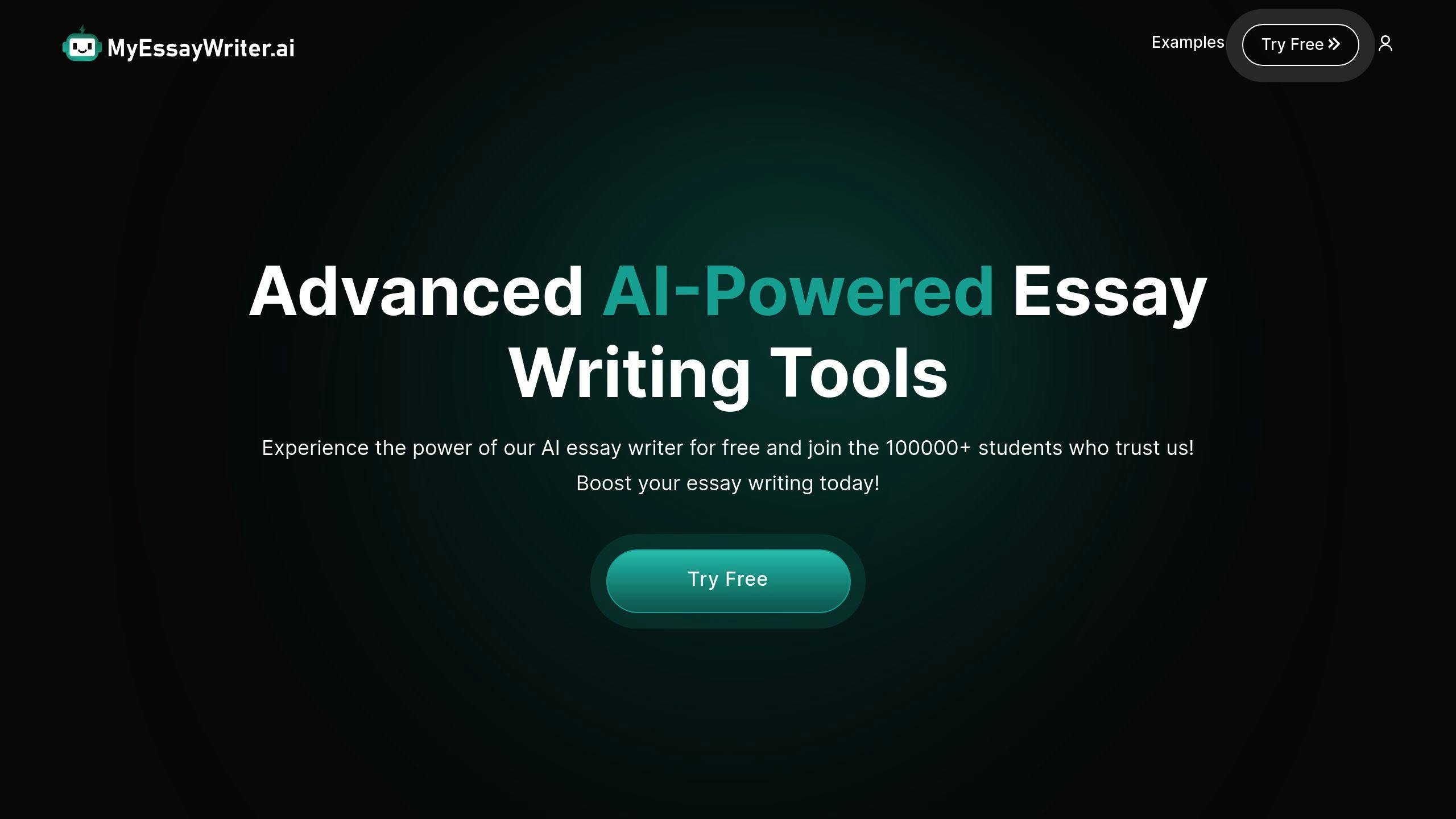
MyEssayWriter.ai is designed to assist with academic writing, offering tools that focus on generating and refining essays. It blends automated writing features with customization options to cater to various academic requirements.
Key Features and Tools
- Creates essays across styles like argumentative, persuasive, descriptive, and narrative, tailored to specific topics and academic levels.
- Includes an AI Humanizer to make generated text sound more natural and conversational.
- Built-in plagiarism detection ensures originality, alongside AI-driven content analysis.
- Offers tools for paraphrasing and improving content quality.
Plans and Pricing
Subscription options start at $9.99/month for basic features and go up to $99.99/year for advanced access. Higher-tier plans include essay writing, plagiarism checks, and unlimited use of tools.
User Feedback and Performance
With a 3.2-star rating from 173 reviews [5], MyEssayWriter.ai is appreciated for its quick essay generation. However, users often find that the output requires extensive editing to align with academic expectations.
Challenges to Consider
- Generated essays frequently need significant revisions to meet academic standards.
- Content quality can be inconsistent, with some essays feeling overly generic.
- Lower-tier plans come with word limits.
- Additional editing may be required to avoid detection as AI-generated content.
Best Use Cases
This tool is great for creating first drafts, organizing research papers, and polishing grammar and style. However, users should use the generated essays as starting points, reviewing and refining them thoroughly before submission.
While MyEssayWriter.ai is helpful for draft creation, those needing deeper research or learning support might explore alternatives like Elicit or Socratic for more robust solutions.
Comparison of Features and Drawbacks
Here's how some popular academic tools stack up across important criteria for academic use:
| Tool | Key Strengths | Key Limitations | Best For | Pricing |
|---|---|---|---|---|
| Yomu AI | • AI autocomplete • Citation generator • Plagiarism checker |
• Limited free credits | Research papers, Citations | Free plan + Paid tiers |
| Elicit | • Research-focused • Literature analysis • Data synthesis |
• Limited writing features | Research assistance, Literature reviews | Free with usage-based pricing |
| Learnt.ai | • Learning support • Writing assistance • Interactive tools |
• Primarily learning-focused | Collaborative learning and writing support | Various subscription options |
| Socratic | • Interactive learning • Subject-specific help • Visual explanations |
• Limited advanced writing features | Homework help, Subject understanding | Free |
| EduWriter.ai | • Original content verification • APA formatting • Reference management |
• Content requires review • Limited free options |
Essay writing, Academic papers | One free essay (2 pages) |
| MyEssayWriter.ai | • Natural language processing • Multiple essay styles • Plagiarism detection |
• Inconsistent quality • Requires significant editing |
Draft creation, Essay outlines | Starts at $9.99/month |
When deciding on an academic AI tool, it's important to think about factors like plagiarism detection, citation management, and cost. Each tool shines in different areas: Elicit is great for research and literature reviews, while Socratic is better for homework help and subject understanding.
Here are some standout features that might help you decide:
- Yomu AI includes a built-in plagiarism checker.
- MyEssayWriter.ai focuses on content originality.
- EduWriter.ai simplifies citation and reference management.
In terms of integration, the tools vary:
- Elicit connects with research databases for seamless access.
- Learnt.ai supports collaboration for group work.
- Socratic works well with educational platforms.
Pricing ranges from free options like Socratic to subscription services such as MyEssayWriter.ai. Most tools offer some free features, but you'll often need to pay for advanced functions.
This breakdown helps you weigh your options and choose the tool that fits your academic needs best.
Summary and Recommendations
Several alternatives to ChatGPT stand out for specific academic tasks, offering features tailored to meet diverse academic needs.
For research-focused tasks, Elicit is a standout option. It’s particularly well-suited for tasks like:
- Literature reviews
- Preparing research papers
- Collecting academic data
- Conducting systematic research analysis
If you're looking for writing assistance, Yomu AI is a top choice. It combines AI autocomplete, citation tools, and plagiarism detection to help refine academic writing.
For learning support and homework help, Socratic is hard to beat. Its visual explanations and subject-specific guidance make it ideal for:
- Breaking down complex concepts
- Homework support
- Interactive and visual learning
When it comes to essay writing, the right tool depends on your specific needs:
- EduWriter.ai: Great for formatting and references
- MyEssayWriter.ai: Focused on draft creation
- Learnt.ai: Perfect for collaborative learning environments
Graduate students and researchers working on large projects may find SciSpace Literature Review especially helpful for maintaining integrity and saving time [1].
Budget-Friendly Options
- Free: Socratic offers excellent general academic support at no cost.
- Low budget: EduWriter.ai includes a free 2-page essay option.
- Professional-grade: Both Yomu AI and Elicit are worth considering for their comprehensive features.
Remember, these tools are designed to enhance your academic workflow - not replace your original research. Choose the tools that align with your needs while upholding academic integrity.
For more tips on picking the right tool, check out the FAQs.
FAQs
Here are answers to common questions about AI tools for essay writing to help you choose the right one for your needs.
What is the best AI tool for essay writing?
The best tool depends on what you’re looking for in your academic writing process:
- For research-heavy writing: SciSpace Literature Review is ideal. It excels at analyzing research gaps and gives access to over 282 million scientific papers [1].
- For detailed academic writing: Yomu AI is a solid choice, known for integrating research seamlessly while meeting academic standards [2].
- For general essay help: Tools like MyEssayWriter.ai and EduWriter.ai are great for customizing essays based on specific topics while ensuring originality.
"Your role as the researcher is to guide the AI. Be clear about the central thesis, arguments, and guide it through the process." [3]
Each tool caters to different types of writing tasks:
- Use SciSpace Literature Review for research papers and systematic reviews.
- Choose Yomu AI for more complex academic writing.
- Opt for MyEssayWriter.ai or EduWriter.ai for simpler essay assistance.
The key is finding a tool that aligns with your academic goals while ensuring your work remains high-quality and original. Think about your subject area, academic level, and specific requirements when deciding.
Ethical Tips for Using AI Tools:
- Always verify AI-generated content against trusted sources.
- Keep your unique voice and critical thinking in your writing.
- Treat these tools as helpers to enhance your work, not as replacements for your research efforts.
